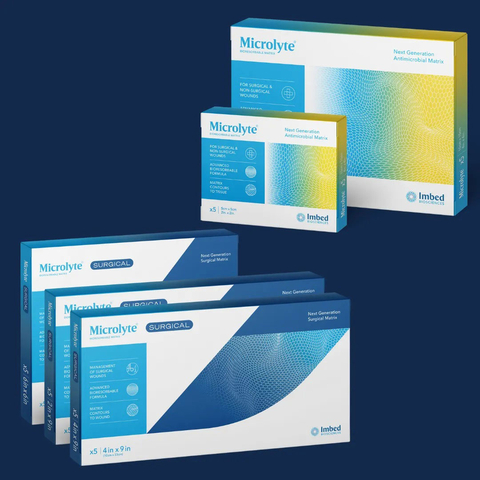MADISON, Wis.– Imbed Biosciences Inc. (Imbed), a developer of next-generation therapies for tissue repair, and Spartan Medical, a veteran-owned Federal Contractor with fourteen years of flawless performance, jointly announced today that Imbed’s Microlyte® Matrix wound dressing portfolio has been added to Spartan Medical’s VA IDIQ Contract with the U.S. Department of Veteran Affairs (VA). The IDIQ contract, which is abbreviation for indefinite-delivery and indefinite-quantity, will streamline the procurement process at VA hospital systems and expedite product delivery in care of our nation’s heroes. Under this contract, any VA hospital can order as many quantities of Microlyte® Matrix, and as many times as they need it, while complying and operating under the preferred contract vehicle within the VHA.
“Microlyte® Matrix portfolio is approved by VA’s Strategic Acquisition Center (SAC) as part of our VA National IDIQ Contract #36C10G18D0143, keeping true to our ethos of providing the best care to those who deserve it most. The approval makes this innovative technology readily available for order by any clinician or administrator at any VA facility nationwide,” said Vince Proffitt, President and CEO of Spartan Medical.
The Veterans Health Administration (VHA) is the largest integrated health care system in the US, providing care at nearly 1,300 healthcare facilities to over 9 million Veterans enrolled in the VA health care program.
“We are proud to partner with Spartan Medical in bringing this latest innovation in wound management to the VA in service of our veterans. The IDIQ contract gives Microlyte Matrix a rare opportunity to have access to the whole integrated healthcare system of the VHA, leaving no veteran behind,” said Ankit Agarwal, PhD, President and CEO of Imbed.
“In published clinical studies, the antimicrobial Microlyte Matrix has been shown to jump start healing of stalled chronic wounds, and also reduce the incidence of surgical-site infections in high-risk patients,” said Dr. Michael Schurr, MD, co-founder of Imbed, and a critical care surgeon at Mission Hospital in Asheville, NC. “The effectiveness of Microlyte® Matrix has been associated with its ultrathin multilayer architecture that contours intimately to underlying wound surface, provides a template for tissue growth, and kills bacteria in contact hidden in crevices. These studies recommend considering Microlyte® Matrix as the primary antimicrobial dressing in standard protocols of care for complex wounds. It could significantly improve the healing of chronic and surgical wounds, and thereby, reduce the use of antibiotics and opioids, saving government billions of dollars in healthcare costs.”


